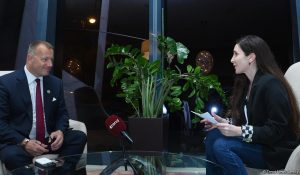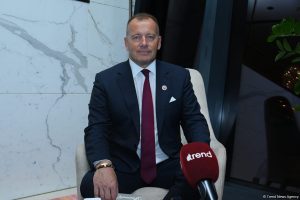Slovakia to start construction of smart village in Karabakh in spring 2024
Slovakia will start the construction of a smart village in Azerbaijan’s Karabakh in spring of 2024, Speaker of the National Council of the Slovak Republic Boris Kollar said in an exclusive interview with Trend, as he visited Azerbaijan.
“An agreement on the project documentation will be signed here on construction of a smart village in Bash Garvand village of Azerbaijan’s Aghdam district. We were discussing this smart village project with President Ilham Aliyev. The project documentation should be ready by February of the next year. Azerbaijan wants to accelerate the entire process. Sometimes in the spring, the construction of the smart village should start.
It will be a pilot project for the time being. Azerbaijan would like to build about 100 such smart villages. The first project will be intended for about 5000 houses. There is to be a huge reconstruction work taking place in Karabakh. It is a project for maybe 20-30 years, because building 100 such villages will take time. We don’t know whether our Slovak company will win the other projects or not. There is a Slovak saying: “The longest way starts with the first step”. So, this is in fact the first step,” he said.
Kollar went on to add that Azerbaijan and Slovakia were discussing the possibilities of establishing joint ventures in various areas.
“For example, one of such joint ventures can be established here in Azerbaijan. Business representatives are also accompanying me during this visit. Director general of the state enterprise KONSTRUKTA – Defence, manufacturing ammunition and haubitzers is also here with us during this visit. We discussed this idea for the first time when the adviser to Azerbaijan’s president visited Bratislava to attend the GLOBSEC Security Conference this year. We were discussing the possibility of creating a joint venture, which could operate here in Azerbaijan. So, this is my objective for the near future,” he explained.
Slovakian parliament speaker also talked about the ways of boosting bilateral trade relations.
“It’s a mutual cooperation. We take raw materials like oil from Azerbaijan and there are other trade commodities, which can be mutually exchanged. This is the way how the mutual trade is created. Speaker of Azerbaijani parliament Sahiba Gafarova visited Slovakia in 2021. We were very much impressed by her visit and decided to come over here. We have new friends here and these relations are really very friendly. This is very good for further development of relations between the two countries. It is important to meet together and get closer. The mayor of the city of Trencin, which was awarded the title of European Capital of Culture 2026, is also here. He would like to establish cooperation between Trencin and Azerbaijan’s Shusha city. Representatives of Shusha city could take part in various European conferences or other events. We can also have an exchange of football players and matches together,” he added.
As for energy cooperation, Kollar recalled that last year Slovakia received the first volume of Azerbaijani oil for the refinery.
“The European Union wants to diversify the energy sources. And Slovakia doesn’t want to be dependent only on the Russian oil and gas. Currently, we import oil from Qatar and liquefied natural gas (LNG) from the US. Two years ago, we were discussing the possibility of oil supplies from Azerbaijan. And last December, our company received the first supplies of oil from Azerbaijan for the refinery. Slovakia was among the countries to sign a memorandum of understanding in April this year in Bulgaria on Solidarity Ring, which will enable the transportation of additional gas from Azerbaijan. Azerbaijan is a safe country, there is no risk, so we can bring about long-term contracts. In a month my mandate as a speaker of the parliament will end, as we will have parliamentary elections in the end of September. So, I am here, just like in other countries, to say goodbye to those with whom we have better than standard relations,” he concluded.
Interviewer: Laman Zeynalova
Source of the text: trend.az




